|
The Greatest Tearjerkers of All-Time
|
|
Title Screen
|
Movie Title/Year and Brief Tearjerker Scene Description
|
Screenshots
|

|
Hamlet (1996, UK/US)
- the brilliant portrayal of
Ophelia (Kate Winslet) who was driven insane and strait-jacketed;
she was suffering after the death of her father Polonius (Richard
Briers), who was murdered at the hands of her ex-lover/fiancee
Hamlet (Kenneth Branagh) - who had also rejected her
- Ophelia offered
reeds and called them various flowers: ("There's
rosemary, that's for remembrance; pray, Love, remember: and there
is pansies. That's for thoughts...There's fennel for you, and columbines:
there's rue for you; and here's some for me: we may call it herb-grace
o' Sundays: O you must wear your rue with a difference. There's
a daisy: I would give you some violets, but they withered all when
my father died: they say he made a good end --")
- then she
sang before
she left and entered her padded room: ("And will he not come
again? And will he not come again? No, no, he is dead: Go to thy
death-bed: He never will come again. His beard was as white as snow,
all flaxen was his poll: he is gone, he is gone, and we cast away
moan: God have mercy on his soul! And of all Christian souls, I pray
God. God be with ye")
- soon,
she set out to commit suicide (off-screen), and ended up a victim
of drowning
|

Strait-Jacketed Ophelia

Offering of Flowers

Ophelia Singing

Ophelia - Suicidal Drowning Victim
|

|
Happy Feet (2006)
- the scene of baby emperor penguin Mumble's (voice
of Elijah Wood) frustrated teacher Miss Viola (voice of Magda Szubanski)
discovering that Mumble
did not have a heartsong ("A penguin without
a heartsong is hardly a penguin at all") - a romantic song
that would attract a soulmate
- Mumble, with a tremendous ability to dance,
ostracized from the group that feared that his 'happy feet' were
responsible for famine; Mumble counter-argued: ("Wait a minute,
happy feet can't cause a famine"), with the elder's retort: ("If
thy kind of pagan display didn't cause it, what did?...He drove
the fish away, and now he's ranting this rubbish!..And so it follows.
Dissent leads to division and division leads us to doom. You,
Mumble Happy Feet, must go")
- the heart-wrenching scene when exiled Mumble
futilely chased an "alien" fishing boat through large,
choppy waves and ended up half-dead on the beach of a large city
- he was placed in an aquarium where he slowly lost his mind,
with the achingly-poignant moment when he performed a soft-shoe
routine to communicate with a little girl (a biped "alien")
and her mother on the other side of the display glass - and soon
became a sensation

|

|
- the joyous finale, in which Mumble convinced the
other penguins to join in a communal dance to communicate
with arriving "aliens" (humans)
|

Young Mumble

Ostracized by Elders
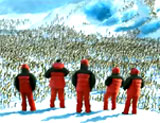
The Arriving 'Aliens'
|

|
High Sierra (1941)
- the heartbreaking scene of aging gangster Roy "Mad
Dog" Earle's (Humphrey Bogart) visit to see a post-surgical
club-footed Velma (Joan Leslie) ("We can still be friends...")
- the film's suspenseful manhunt high up in the Sierra
Mountains as police pursued Earle in a doomed last stand when his
'tarnished angel' friend Marie (Ida Lupino) refused to call out
to him as she told the authorities: ("He's gonna die anyway,
I'd rather it was this way. Go on, all of you, kill him, kill him...");
after Earle's body rolled down the steep rocky cliff, his dog Pard
licked his hand
- after
Earle had been shot dead when he called out to Marie in the open,
she asked: "Mister, what does it mean when a man crashes
out?"; she was told: "Crashes out? That's a funny question
for you to ask now, sister. It means he's free"; she sadly
repeated the word "Free" - questioning Roy's unnecessary
death

|

|
|
"Free"
|
- the final, blurry fadeout on Marie's tear-stained
face as it filled the frame before a pan up to the mountains
|
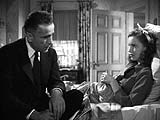
Earle With Velma
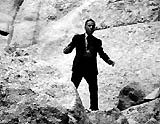
Earle's Last Stand
|
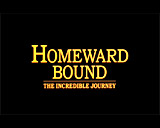
|
Homeward Bound: The Incredible
Journey (1993)
 #49 #49
- the emotional ending in which
the trio of pets, bulldog Chance (voice of Michael J. Fox), Himalayan
cat Sassy (voice of Sally Field), and finally limping golden retriever
Shadow (voice of Don Ameche), completed their 250 mile journey
home

Cat Sassy
|

Golden Retriever Shadow
|

Bulldog Chance
|
- the last line was spoken by an appreciative, barking
Chance: ("As we turned to go inside the house,
a strange new feeling came over me. I had a family, and I had found
out that sacrifice, friendship, and even love were more than just the
mushy stuff...At last, for the first time in my life, I was home")
|

Return of Trio of Pets to Family
|
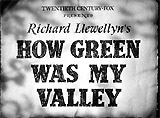
|
How Green
Was My Valley (1941)
- the tragic death of Huw Morgan's
(Roddy McDowell) father Gwilym (Donald Crisp) when he drowned in
a mine shaft accident, with his last words to his son, who was
cradling him in his arms: ("There's
a good old man, you are")
- the nostalgic ending in which
Huw recalled the happier memories of his youth as a chorus sang during
a montage of the Morgan family at supper time, of Huw's first view
of Bronwyn (Anna Lee) with the double basket on her hip, of Angharad
(Maureen O'Hara) at the gate watching and waving at Mr. Gruffydd
(Walter Pidgeon) and Huw returning through a hillside of blooming
flowers
- there was also a view of Huw and his father walking
hand-in-hand over the crest of a hill, as they did in the film's
opening sequence, and a glimpse of the five brothers in an open
field.
|

Huw's Father Gwilym Dying in His Arms
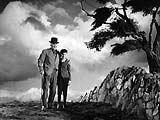
Nostalgic Ending - Huw Walking With His Father
|
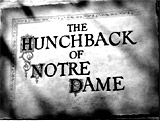
|
The Hunchback of Notre Dame
(1939)
- the extremely touching scene in which beautiful gypsy
girl Esmeralda (Maureen O'Hara) mercifully offered a drink of water
to the deformed hunchback bellringer Quasimodo (Charles Laughton)
after a public scourging
- Quasimodo's heartbreaking closing line
next to a gargoyle high atop Notre Dame's Cathedral: ("Why was
I not made of stone like thee?")
|

Esmeralda Offering Water to Quasimodo

"Why was I not made of stone like thee?"
|
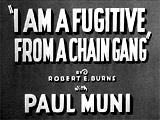
|
I Am a
Fugitive From a Chain Gang (1932)
- the visually impressive and chilling, downbeat fade-out
ending when hunted, falsely-accused fugitive James Allen (Paul Muni)
responded to his fiancee Helen (Helen Vinson) about how he lived
- "I steal" - as he receded into the shadowy darkness
|

"I steal"
|

|
I Am Legend (2007)
- the scene of virologist scientist Dr. Robert Neville
(Will Smith) mercy-killing his loyal companion and dog Samantha ("Sam")
after it was attacked and wounded by a pack of infected, zombie-ish
dogs when trying to protect him from Dark Seekers; anguished, he
cradled his beloved German shepherd in his arms after injecting it
with an experimental serum and then sang Three Little Birds by
Bob Marley ("Don't worry about a thing, 'Cause ev'ry little
thing, Gonna be alright") - but after noticing the dog's hair
loss, tooth growth and increasingly aggressive behavior, he realized
it was infected and snapped its neck (or suffocated it)
- the next
day after burying Sam, Neville's visit to the neighborhood video/DVD
rental store where a pretty female mannequin was posed in one of
the aisles, and he went up to it - piteously entreating the unresponsive
figure: ("I
promised my friend that I would say hello to you today. Hello. Hello.
Please say hello to me. Please say hello to me")
|

Mercy Killing of Dog Samantha

Sam with Mannequin
|

|
Imitation of Life (1959)
 #32 #32
- a remake of director John M. Stahl's Imitation
of Life (1934), with Claudette Colbert and Louise Beavers
- the scene in an alley in which Frankie (Troy Donahue),
the date of light-skinned Sarah Jane Johnson (Susan Kohner), racistly
asked: "Is it true?...Is your mother a nigger?" - and then
accused her of lying and slapped her to the ground
- and later, the scene
in a Hollywood motel room in which estranged
black-maid mother Annie Johnson (Juanita Moore) (who was in the employ
of actress Lora Meredith (Lana Turner)) met with her daughter Sarah
Jane, who was essentially disowning her mother: "I'm white!
White!...and if by accident, if we should ever pass on the street,
please don't recognize me"; then, Sarah Jane's mother made one
last request or wish: "I'd
like to hold ya in my arms once more like you was still my baby...
Oh, my baby, my beautiful, beautiful baby. I love you so much. Nothin'
you ever do can stop that"
- in the funeral scene finale with
Mahalia Jackson singing
"Trouble of the World," Sarah Jane unexpectedly returned
for her mother's funeral, rushed to the casket, and sobbed uncontrollably
as she apologized: ("Mama, Mama, I didn't mean it, I didn't mean
it. Mama, do you hear me? I'm so sorry, I'm sorry, Mama. Mama, I did
love you...I
killed my mother, I killed her. I wanted to come home. Now she'll never
know how much I wanted to come home")

|

|
|
Sobbing Sarah Jane at Her Mother's Funeral
|
|



Emotional Mother-Daughter Reunion
|
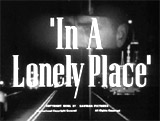
|
In a Lonely Place (1950)
- cynical, hard-living, self-destructive and volatile
Hollywood screenwriter Dixon Steele's (Humphrey Bogart) famed line
of dialogue, a line of script written for some future work, that
he told to his cool, beautiful blonde next-door
apartment neighbor Laurel Gray (Gloria Grahame) while driving together: "I
was born when she kissed me. I died when she left me. I lived a few
weeks while she loved me." -
she repeated the phrase back to him - but hesitated on the last sentence
- Laurel's teary words when
saying goodbye to Dixon as he walked away after
their relationship had deteriorated by film's end: ("I lived
a few weeks while you loved me. Goodbye Dix...")
|

"I was born when she kissed me..."

Laurel's Teary Goodbye to Dixon
|

|
In Country (1989)
- the achingly poignant and moving
climax in which lively teenaged Kentucky girl Samantha "Sam" Hughes
(Emily Lloyd), haunted Vietnam vet and Samantha's uncle Emmett
Smith (Bruce Willis), and Samantha's overweight grandmother Mamaw
(Peggy Rea) visited the Vietnam Veterans War Memorial in Washington,
DC (just built at the time of this film's release) to honor Samantha's
father, who had died before she was born while serving in Vietnam
- Mamaw's reaction: ("I
think I'm gonna bawl")
- and the moment Emmett located the names of his fallen comrades
|


Visit to the Vietnam Vet's War Memorial
|

|
In the Company of Men (1997)
- writer/director Neil LaBute's
disturbing drama about cruel, premeditated, retributive revenge sought
against one innocent female victim
- the scene in which handsome,
misogynistic corporate ex frat-boy Chad (Aaron Eckhart) proposed
a "game" to
bespectacled business colleague/nice-guy college pal Howard (Matt
Malloy) that they find an unattractive woman, date her, and then
unceremoniously dump her during their six week stint at a business
branch office. Chad selected deaf and naive secretarial assistant
temp worker Christine (Stacy Edwards), a dark-haired beauty, as their
innocent, targeted female. In week five, Chad slept with her and
she believed he was in love with her. Howard, on the other hand,
had genuinely fallen in love with Christine, but was dropped by her
- Howard told
Christine (out of guilt, hurt, and jealousy) that Chad's love was
a total sham and that they had planned the game together ("He
doesn't like you. He loathes you. He detests you and your pathetic
retard voice. That's what he calls it...You better wake up. You were
used. It was a game"),
but she had trouble believing him ("Chad would never do that")
- in week six, Christine met with
Chad in a hotel room, when she asked: "Do
you love me?" and
then admitted that she knew about his duplicity in the game: ("I
know what's going on...You two were playing a game on me, right?").
Chad quickly attempted to explain his participation in a "contest" to
date Christine, but then admitted he couldn't keep a "straight
face" telling the excuse. When he asked how she felt, she slapped
him hard across the face. He asked: "It only hurts that much?" and
then promptly left the room, dumping her ("The deed's done").
He left her in the room where the emotionally-devastated Christine
sobbed uncontrollably
|

Chad with Christine

Christine - Emotionally Devastated and Used
|
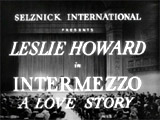
|
Intermezzo: A Love Story (1939)
- the entire doomed and forbidden love affair between
married world-famous virtuoso concert violinist Holger Brandt (Leslie
Howard) and his 6 year-old daughter Ann Marie's (Ann E. Todd) comely
piano teacher-accompanist Miss Anita Hoffman (Ingrid Bergman in her
first American-Hollywood film) - and the scene of their passionately
playing a duet together
- the sequence during a holiday in France, after Anita
had served on an extended musical tour with Holger as his replacement
accompanist, when she received a letter and he insisted: "If
it's an invitation, you can just turn it down. I'm not going to let
you out of my sight for one moment, young lady"; she was offered
a coveted, career-advancing Jenny Lind musical scholarship - and
later at dinner time, she fatefully decided to burn it in his presence,
so that they would not become separated: ("But I don't want
it now, Holger. No, I'm-I'm not taking it...This is how I feel about
the letter, about anything that could come between us")
- the scene of the loving couple on a yacht, when Anita
wished to escape from reality with Holger forever: ("Oh, no,
I don't want to go home. Not yet, please... I am afraid. I don't
know why but I am afraid. I wish we could stay out here forever...What
a wonderful day this has been!...I can't bear to see it end...Hold
me close, Holg, hold me close")
- the use of Stravinsky's Rite of Spring as a
metaphorical idea and musical theme
- the scene in which Holger begged Anita to not get
on a train (she was going away to Sweden to escape their forbidden
affair)
- the scene at a tombstone on the French Riviera with
its words: "Mon amour dure apres la mort (My love
endures after death)" - and Anita's departure from Holger
after realizing their love affair would not last: "I have been
an intermezzo in his life"
- the image of her tears after she had bid Holger good-bye
(without telling him that she was leaving him forever) -- followed
by her Dear John letter: ("...But we know in our hearts that
love like ours is wrong -- that it drags itself down with remorse
and fears, and the unhappiness of others...")
- the startling, heart-breaking scene in which Holger's
daughter Ann Marie was struck by a car and seriously-injured when
rushing to greet her father
- Holger's line to his bitter son Eric (Douglas Scott):
"You see, Eric, even if you don't need me anymore, now it's I
who need you"
- the last shot in which Holger's wife Margit (Edna
Best) descended stairs and sought reconciliation - she forgave Holger
for his mid-life crisis/affair: ("Holger ...welcome home ...Holger,
welcome home!")
[Note: Bergman was reprising her star-making role
from the original Intermezzo (1936, Swe.),
with co-star Gosta Ekman and directed by
Gustaf Molander.]
|

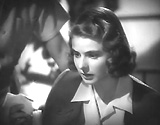
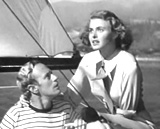




|
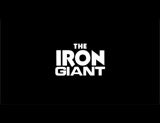
|
The Iron Giant (1999)
 #37 #37
- the scene in which a deer was shot
by hunters with a gun in front of young 9 year-old Hogarth Hughes (voice
of Eli Marienthal) and his 50-foot robot friend The Iron Giant (voice
of Vin Diesel) - with the life lessons taught by Hogarth to the Iron
Giant afterwards: (Hogarth: "I know you feel bad about the deer.
But it's not your fault. Things die. It's part of life. It's bad
to kill. But it's not bad to die." Giant: "You die?" Hogarth: "Well,
yes, someday." Giant: "I die?" Hogarth: "I don't know. You're made
of metal, but you have feelings. And you think about things. And
that means you have a soul. And souls don't die." Giant: "Soul?"
Hogarth: "Mom says it's something inside of all good things, and
that it goes on forever and ever." Giant: "Souls don't die.")
- the climactic
ending, when the Iron Giant realized that he must sacrifice himself
to save the small Maine town of Rockwell from a nuclear missile.
He told Hogarth: ("You stay, I go. No following"),
as Hogarth replied: "I love you."
- just before the explosion
in outer space, the Giant soared into the air to neutralize it by
striking it head-on; he heard the words of Hogarth: "You are who
you choose to be", then realized his heroism and identity: "Superman!" to
a swelling score
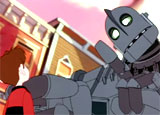
|
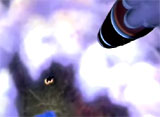
|
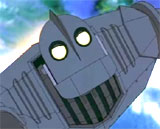
|
|
The Iron Giant's Self-Sacrifice
|
- the Iron Giant was then seen memorialized in a statue
in the town of Rockwell, Maine, and last seen in a final shot smiling
as he self-repaired on an Icelandic glacier - signaling for all his
disassembled parts to regroup
|
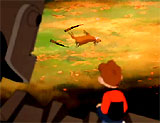
Death of Deer
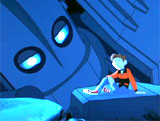

Hogarth with the Iron Giant
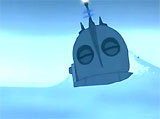
Iron Giant in Glacier
|
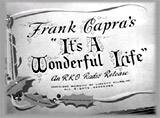
|
It's a Wonderful Life (1946)
 #5
#5
 #4
#4
- the sorrowful scene in which George Bailey (Jimmy Stewart),
while dealing with a "Pottersville" alternate reality in
which he wished he had never been born, found his former wife Mary
(Donna Reed) - a sorrowful spinster librarian who didn't recognize
him, and screamed to get away from him on the street
- the triumphant
scene in which a joyful George Bailey was released from the hellish "Pottersville"
reality: ("Ha, ha, ha, ha! My mouth's bleeding, Bert! My mouth's
bleeding! Zuzu's petals... Zuzu... Merry Christmas!"), and George
ran through the town of Bedford Falls, welcoming back his favorite
places
- the miraculous heartwarming
finale in which George ("the
richest man in town") was surrounded by all of his friends and
associates in his home next to the Christmas tree to sing Hark
the Herald Angels Sing and Auld Lang Syne - all his friends
had paid his rent, and he was toasted by his war-hero brother Harry
(Todd Karns): ("A toast...to
my big brother, George. The richest man in town"), as he and Mary
looked at the handwritten inscription by angel Clarence in the front
of the book
Tom Sawyer: ("Dear George: - Remember no man is
a failure who has friends. Thanks for the wings! Love Clarence");
and Zuzu noted how an ornamental bell was ringing on the Christmas
tree: ("Every
time a bell rings, an angel gets his wings") - signifying Clarence's
promotion to an angel with wings
|
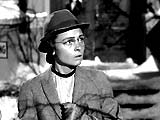
Mary as Spinster Who Didn't Recognize George

"Zuzu's Petals...Zuzu..."
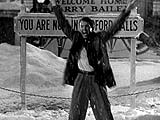
George's Joy After Returning to Bedford Falls

"Every time a bell rings, an angel gets his wings"
|























































